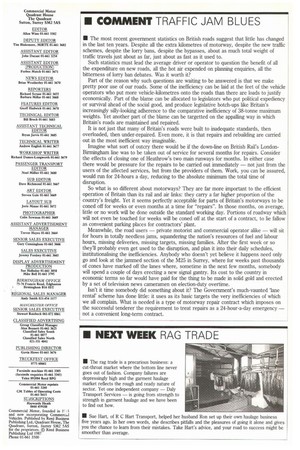• COMMENT TRAFFIC JAM BLUES
Page 5

If you've noticed an error in this article please click here to report it so we can fix it.
• The most recent government statistics on British roads suggest that little has changed in the last ten years. Despite all the extra kilometres of motorway, despite the new traffic schemes, despite the lorry bans, despite the bypasses, about as much total weight of traffic travels just about as far, just about as fast as it used to.
Such statistics must lead the average driver or operator to question the benefit of all the expenditure on new roads, all the hot air expended on planning enquiries, all the bitterness of lorry ban debates. Was it worth it?
Part of the reason why such questions are waiting to be answered is that we make pretty poor use of our roads. Some of the inefficiency can be laid at the feet of the vehicle operators who put more vehicle-kilometres onto the roads than there are loads to justify economically. Part of the blame can be allocated to legislators who put political expediency or survival ahead of the social good, and produce legislative botch-ups like Britain's increasingly silly-looking adherence to the comparative inefficiency of 38-tonne maximum weights. Yet another part of the blame can be targetted on the appalling way in which Britain's roads are maintained and repaired.
It is not just that many of Britain's roads were built to inadequate standards, then overloaded, then under-repaired. Even more, it is that repairs and rebuilding are carried out in the most inefficient way imaginable.
Imagine what sort of outcry there would be if the down-line on British Rail's LondonBirmingham line was to be taken out of service for several months for repairs. Consider the effects of closing one of Heathrow's two main runways for months. In either case there would be pressure for the repairs to be carried out immediately — not just from the users of the affected services, but from the providers of them. Work, you can be assured, would run for 24-hours a day, reducing to the absolute minimum the total time of disruption.
So what is so different about motorways? They are far more important to the efficient operation of Britain than its rail and air links: they carry a far higher proportion of the country's freight. Yet it seems perfectly acceptable for parts of Britain's motorways to be coned off for weeks or even months at a time for "repairs". In those months, on average, little or no work will be done outside the standard working day. Portions of roadway which will not even be touched for weeks will be coned off at the start of a contract, to lie fallow as convenient parking places for contractors' plant.
Meanwhile, the road users — private motorist and commercial operator alike — will sit for hours in totally needless jams, squandering the nation's resources of fuel and labour hours, missing deliveries, missing targets, missing families. After the first week or so they'll probably even get used to the disruption, and plan it into their daily schedules, institutionalising the inefficiencies. Anybody who doesn't yet believe it happens need only go and look at the jammed section of the M25 in Surrey, where for weeks past thousands of cones have marked off the lanes where, sometime in the next few months, somebody will spend a couple of days erecting a new signal gantry. Its cost to the country in economic terms so far would have paid for the thing to be made in solid gold and erected by a set of television news cameramen on election-duty overtime.
Isn't it time somebody did something about it? The Government's much-vaunted 'lane rental' scheme has done little: it uses as its basic targets the very inefficiencies of which we all complain. What is needed is a type of motorway repair contract which imposes on the successful tenderer the requirement to treat repairs as a 24-hour-a-day emergency — not a convenient long-term contract.




















































































































































